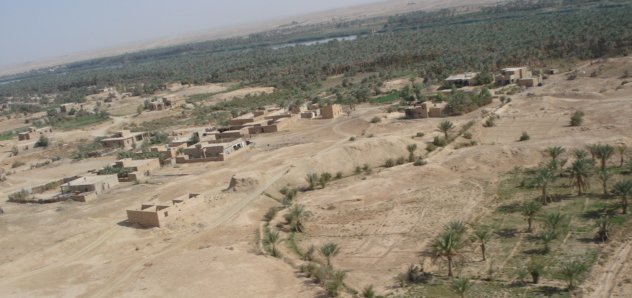CNN ran a report highlighting the failures in Iraq. It is not hard to find troubles and even easier to imagine various things that COULD go wrong. I suppose that is the job of journalists, but that is one reason why people are always anxious. Most of the bad things predicted don’t happen, but by then the journalists are on to the next big potential disaster.
Below is an Iraq village from the air. Same scene as Hamurabi could have seen (if he could fly). Notice the electrical lines are not down. There never were any. Some things take time.

I am getting sick of hearing about electrical shortages in Iraq. Let me give you the ground truth that evidently escapes our intrepid CNN colleagues.
Iraq will NEVER be able to supply electricity 24/7 until it does something fundamental – charge money for it. Journalists never mention – maybe they don’t know or care – that electricity from the government grid is usually essentially free. Even when it is not free, there is rarely a variable price. No surprise then that electrical demand has skyrocketed. Saddam didn’t worry about demand. It was nearly impossible for people to buy new appliances or luxuries. Since the fall of Saddam, the Iraqi people have installed thousands of air conditioners. You see big screen TVs in the markets. People have computers with internet. All these things drain electricity.
The grid supplies a little more electricity than it did before the war and it will supply more soon when we and the Iraqis finish fixing all the maintenance problems Saddam left. It is like buying an old car that is ready to fall apart and then getting blamed for the breakdowns. But in addition to the grid, there has also been an proliferation of small generation. Our ePRT helped pay for some of them. With all these things, Iraq generates more electrical power than ever before. But demand bumps up 12% a year – one of the highest growth rates in the world. Much of that electricity is free and people feel free to waste it.
What do you think would happen in the U.S. if you paid $2 a month and there was no additional charge no matter how much you used? Would anybody turn down their air conditioning or flick off the lights when they left a room? Do you limit yourself to the least expensive items at the all-you-can-eat buffet?
When Iraqis and our intrepid CNN journalists (who I did not see during the entire year I spent in Western Anbar) talk about electricity, they usually mean the free stuff. If you drive through villages at night, you notice that Iraqis have electricity. Some if free or comes at a low flat-rate from the grid, but some of it they pay for – just like you and I do. This is what happens: a town might get six hours of grid electricity. Everybody plugs in everything he owns in anticipation of this happy time. Why not? It is free. When the free electricity is finished and they pay for it people are more careful with the electricity.
It is really the worst possible system. What do you expect when something is provided free for a limited time? Everybody uses as much as they possible can.
You cannot blame the Iraqis. We all would behave like this. If you don’t waste it somebody else will. If any individual saves power, he just gets less.
Only one place I know of – Anah – meters and charges for electricity the way we do in the U.S. and most of the world. Anah has no significant shortages. The leaders of nearby towns dislike Anah. It makes them look bad. It also proves the point.
So next time you hear about electricity shortages in Iraq, keep in mind that this is nearly completely an artificial problem caused by what started off as well-meaning and generous government policy. Well, maybe not that well meaning. Saddam used free electricity to bribe the people, knowing that the lack of electrical appliances would limit demand. No reasonable amount of investment will solve this problem because in its current form the problem is not solvable. It is easy to demand more of something you get free.
The electricity problem is a classic “hot potato”. We made the mistake of defining it as OUR problems and took the blame for a stupid system we inherited from the bad old days. We cannot solve the problem. Nobody can in its current form. We have to toss that hot potato back to those who can address the problem in the ways that will work. And somebody should explain this to CNN. I suspect somebody has tried. Not everybody is teachable. They prefer to look earnestly at the camera and list the failures rather than explain the solution is simple, although not easy.
